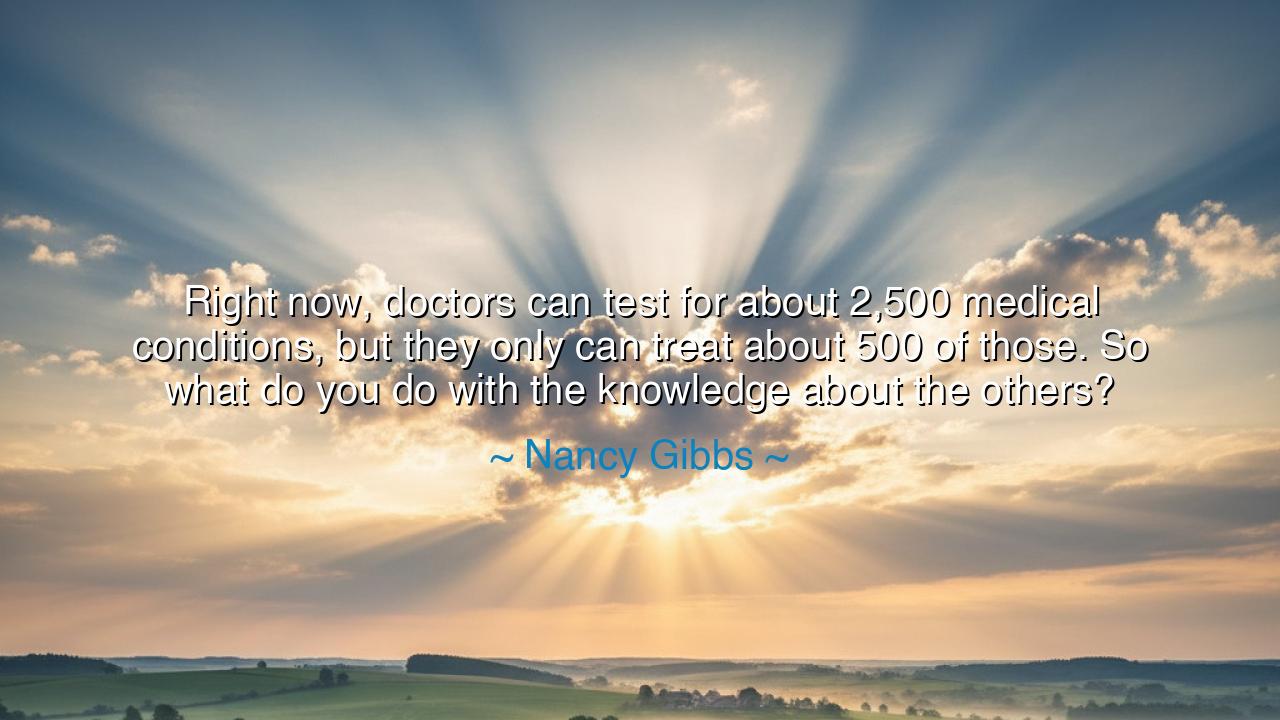
Right now, doctors can test for about 2,500 medical conditions
Right now, doctors can test for about 2,500 medical conditions, but they only can treat about 500 of those. So what do you do with the knowledge about the others?






“Right now, doctors can test for about 2,500 medical conditions, but they only can treat about 500 of those. So what do you do with the knowledge about the others?” Thus spoke Nancy Gibbs, a chronicler of modern civilization’s conscience, whose words pierce with both wonder and unease. In this reflection, she unveils the paradox of progress — that knowledge, though vast, is not the same as wisdom, and that discovery without understanding can wound as deeply as it heals. Her question is not only medical; it is moral, philosophical, and profoundly human. What happens, she asks, when our power to know exceeds our power to act?
Her words rise from the age of information and biotechnology, when science can gaze into the hidden code of life itself — the genes, the molecules, the silent seeds of destiny. Doctors and scientists now hold in their hands the ability to foresee diseases long before they manifest, to name conditions that may never be cured, to glimpse the shadows within the body’s design. And yet, for many of these conditions, there is no remedy — only forewarning. Knowledge without cure, truth without deliverance — this is the burden Gibbs speaks of. The healer has become a prophet of uncertainty, bearing messages that may comfort or torment, depending on the heart that receives them.
In ancient times, knowledge was sacred, and those who held it — the physicians, the philosophers, the seers — bore the weight of it with reverence. Hippocrates, the father of medicine, once cautioned that “to know is not enough, unless one also acts.” Yet in our age, Gibbs shows us the return of the ancient dilemma: the widening gap between human intellect and human capacity. The gods of progress have granted us vision beyond our means — we can name the illness, trace its root, predict its coming — but not yet banish it. Thus, her question — “What do you do with the knowledge about the others?” — becomes both haunting and holy. It is the question of a civilization peering into the mirror of its own genius, and seeing, reflected there, its limitations.
Consider the story of Gregor Mendel, the monk who first unlocked the laws of heredity. In his lifetime, his knowledge lay dormant, misunderstood, forgotten. It took generations for the world to see the power of his insight — the seeds of genetics that would one day transform medicine. But as Gibbs’s words remind us, every revelation carries a reckoning. The same knowledge that heals can also divide; the same insight that empowers can also burden. To know the risk of a disease one cannot prevent — this is both gift and curse. The weight of knowledge becomes a new form of suffering, not of body, but of spirit.
And yet, Gibbs does not despair — she asks. And in her question lies a call to ethical imagination. What do we do with the knowledge we cannot yet use? We must learn to hold it wisely. Not to exploit it for fear, or profit, or control — but to use it as a seed of compassion and purpose. We must invest in research, nurture patience, and above all, remember that medicine is not merely the conquest of disease, but the care of the human soul. Where there is no cure, there can still be comfort. Where there is no remedy, there can still be relationship, dignity, and hope.
Throughout history, the wise have known that understanding is a double-edged sword. Prometheus, who stole fire from the gods, gave mankind warmth and light — but also the risk of destruction. In the same way, our modern medicine wields both salvation and sorrow. Gibbs’s words are a reminder that humility must walk hand in hand with discovery. The physician, like the philosopher, must ask not only, “What can I know?” but also, “What should I do with what I know?” This balance — between intellect and conscience — is the true measure of civilization.
So, my children, take this teaching to heart: knowledge is sacred, but incomplete without wisdom. When you discover truth that cannot yet be used, hold it with patience, not pride. When you meet those who suffer from what cannot be cured, give them not false hope, but steadfast care. Let compassion be the bridge between understanding and healing. For every discovery humanity makes, there must rise an equal measure of mercy.
And remember this, above all: the purpose of knowledge is not domination, but service. As Nancy Gibbs reminds us, the question of what to do with knowledge we cannot yet use is not a riddle to be solved, but a responsibility to be carried. Carry it well — with humility, with courage, and with faith that the wisdom of tomorrow will rise from the compassion of today.






AAdministratorAdministrator
Welcome, honored guests. Please leave a comment, we will respond soon